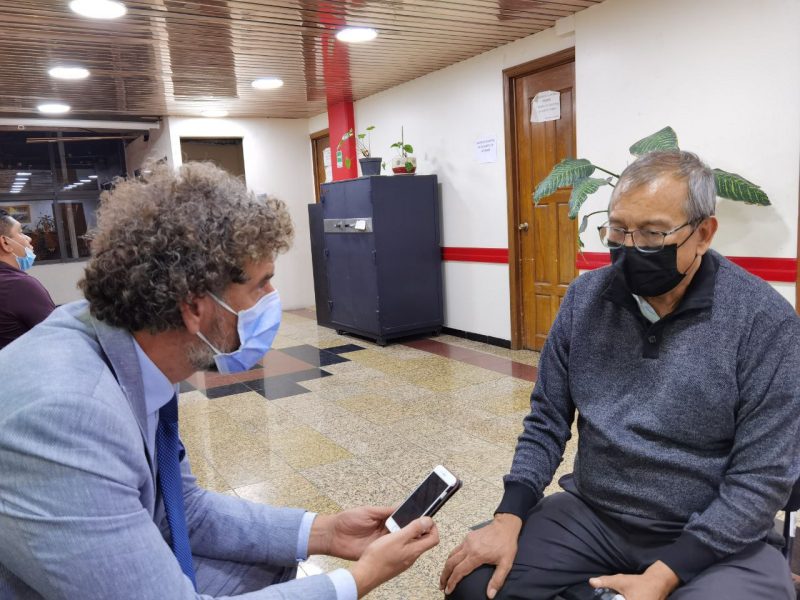More than 90 million registered Mexican voters face the following question on April 10: “Do you agree that Andrés Manuel López Obrador, President of the United States of Mexico should be revoked from his mandate due to loss of confidence, or should he continue his presidency till the end of his term?”
The so-called revocation referendum comes exactly on to the midterm of López Obrador, whose presidency has started on December 1, 2018, and will end on November 30, 2024.
The state’s National Electorate Institute (INE) will hold the referendum. The president already declared that he would fully respect the results and resign from his mandate, should the majority of the electorate demand it. Results are expected from Sunday evening on, but the approval rates of the President have been above 70%, thus a negative outcome is unlikely.
The Mexican political establishment has criticized and even tried to stop the referendum by legal objections. We spoke about the referendum with Pedro Vázquez González, Deputy in the Congress of the Union and a national leader of the Labor Party, which forms part of Mexico’s governing coalition along with MORENA and the Green Party.

What is the context the revocation referendum?
López Obrador’s arrival at the presidency reflected the Mexican society’s aspiration for change and transformation. He represents this change with what he has called the Fourth Transformation.
This has until now focused on improving the situation of have-nots and the forgotten in the former neoliberal system. Elderly, students, young unemployed and mothers for instance receive today direct support to solve basic problems like sustentation, health, education and basic insurances.
The actual energy reform is also part of that transformation: the goal is that our energy and natural resources shall again belong to the Mexican nation. Currently, national and transnational companies benefit extremely from our resources but carry their profits back to their country of origin. This will change.
Altogether, the Fourth Transformation is a process advancing step by step, due to the existence of conflicting economic interests. And it also includes political reforms.
Reform of system of political parties
Can you summarize these?
The system of political parties needs to be strengthened. We are a nation of more than 120 million, represented by only 7 political parties. We need to open the system so that parts of the society, which currently feel unrepresented, find an address.
Political parties with lots of votes are over-represented. There is inequality in the system concerning economic support, media presence and representation in legislative organs.
The reform aims to establish equal conditions for all political parties. We want to make sure that the best political proposal or program wins – and not the one with the biggest economic or financial resources.
In addition, neoliberal sectors and companies still try to stop the Transformation by using basic state institutions such as the INE or the Federal Electoral Tribunal (TRIFE) to interfere into democratic processes. They literally bombard these with objections. Hence, the Labor Party fully supports and collaborates in the democratization of these fundamental institutions of the state.
There are also demands for elements of direct democracy.
That is a very old and fundamental point in the program of the Labor Party. We want to ensure that the society takes part in all matters of decision-making. Our proposals include referendums, plebiscites, peoples’ initiatives, citizens’ representation in local councils.
The Labor Party strongly supports referendums or consultations of the people on topics concerning the fate of our country.
Is the revocation referendum part of these political reforms?
The President has proposed this referendum already during his electoral campaign. We have already had a first experience with the popular consultation (on the construction of a new airport in Mexico City, YS). Though the participation was with 7 millions lower than expected, the consultation was a success.
Revocation referendum shall include all political mandates
The revocation referendum is already present in our constitution. Remember that Mexico is a federal union comprised of free states. Now, revocation referendums are in place for all governors, mayors, local deputies and municipal presidents.
The expectation with the current presidential revocation referendum is the following: we want to fix this measure stronger in the political system and ensure that it is not only applied to the President of the Republic but to all carriers of political mandate.
There is criticism this might lead to instability in the political system.
As a guided and legal process, the referendum will permit the free participation of society. The electoral organs will supervise and control this event of direct democracy.
And it will not cause instability or failure of government. On the contrary, the referendum will strengthen the political structure.
The question presented to our people is clear. It is about the efficiency, utility and success of the López Obrador government. Is he not approved, then he shall simply go.
Let me remind you that the President was not obliged to pursue this referendum. He proposed it on his own initiative and the Labor Party strongly supports it. The constitution says that the term of the president lasts 6 years. But the people get a chance to remove him from his mandate after 3 years in office.
This interview was conducted in Mexico City in October 2021.

















Leave a Reply